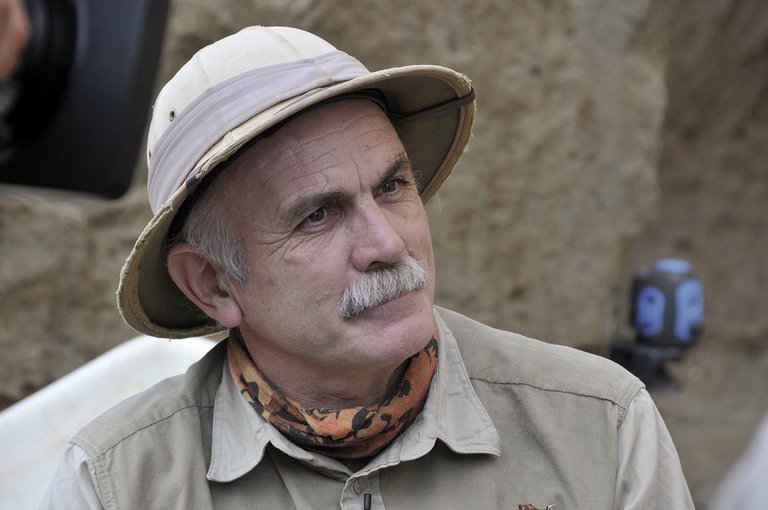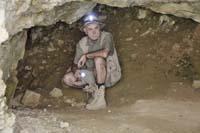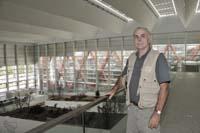"That scientific thought, knowing that what you now know will surely be overcome, that is evolution"

I believe that when a person has so many charges he has made his own. I don't want charges. Although some have the main objective of accumulating positions, scientists want to accumulate knowledge. I at least do, and I continue to work for it. What's more, I think the best thing a person, when he has so many charges, can do is leave everyone aside and work. If not, you end up doing nothing.
Indeed. I did it when I was young, 23 years old. I had more time than now (smiling). It is a very simple logico-analytical system. Through it we analyze objects and, using inferential and analytical statistics, we can see how technology has evolved.
In fact, one of the conclusions of my studies on evolution is that technology is the adaptation that the person has made to us.
Without a doubt. In this sense, technology feeds our way of knowing without interruption. 32 years ago, when we started digging in Atapuerca, we couldn't imagine the technology we would have, both to record data and to analyze samples. This has radically changed the way the record is understood. In this it is also an evolutionary technology and applicable to evolution.
In addition, I believe that the socialization of technology must be the process that makes us human, which will allow us to improve the distribution of energy on our planet.
Of course. Through understanding human phylogeny, you have more elements to use your critical capacity, which have an empirical, solid foundation. In fact, I believe that the content of knowledge is the basis of thought and that technology has allowed us to know.
I said before that the most important thing for me is to investigate. For as important as knowing it is finding it, because finding and finding what we do not know.

Atapuerca, during these 30 years, has given us the opportunity to travel a million and a half years in the same place. That is very important to me and has complemented me as a person. It has made me open my eyes to reality, it has taught me how our genre has adapted to these mountains, how it has evolved. Without that evolution, now we would not be here the two, doing what we are doing, that is, a conversation about knowledge and evolution.
Yes, there has been a change: it is a change from creationism to evolutionism. Darwin dedicates his book to the creation of species in the nineteenth century. Despite its publication in the nineteenth century, the idea that we are above other species has been stuck to society. And that has done, without realizing it, in interpreting the world, to separate Homo sapiens from others, even scientists.
However, evolutionary interpretation has brought us closer to that great complexity. And it is indifferent to look at technology or other aspects such as sexual behavior or the care of the elderly.
Yes, first we find the pelvis of a man of the species Homo heidelbergensis and then some vertebrae of the same individual column. We calculated that he was 50 years old. Therefore, he was old because at that time people were dying young. Even more if they had any error, they had a malformation in the hip. All this has shown us that the team cared well, otherwise it would not become so old.
There are many examples like the jaw of Dmanisi or the skull of the benjamin. All these tests show that we have always been very social. But being socialist does not mean not being aggressive or violent.
All were cannibals and H. sapiens too. In addition, our species has made various types of cannibalism, even political. For example, in the Long March of Mao Zocedon 40,000 enemies were eaten. As there was a lot of famine, it was normal that if they killed someone they ate the dead. Besides political cannibalism, there is social cannibalism, ritual, gastronomic... Cannibalism is a common practice not only in the human being, but also in almost all mammals.
We do not know. There are many explanations: the genetic drift itself, the sudden climatic changes, the wars... Another reason can be the commission of serious errors. For example, on Easter Island, in addition to climate change, human factors influenced the depletion of resources.

If we could know it! It is difficult to say, because if you develop and socialize technology, it will be much more difficult to lose it. Why? If the cause of disappearance is the genetic drift, it can be genetically modified. Or if a catastrophe occurs all over the planet, it is possible that it moves to another planet and makes its life there.
Therefore, I believe that for the first time it may be possible to overcome natural selection after the scientific-technical revolution and its socialization.
No, I think it will not stop, but it can be adapted. Or you can colonize another planet. For this, of course, you will need time, as you will need time to develop the technology necessary to achieve it. But with everything we know now, that technological development can be quite fast. H. neanderthalensis could not do it, nor H. sapiens 5,000 years ago, perhaps in the future. That is evolution.
Yes, it must be taken into account that the increase in social inclusion is related to the development of technology. That is very important. Primates do not accelerate their technological processes because they do not socialize their discoveries. In our case, fire was invented a million years ago, that is, it already existed, of course, but human beings learned to create it a million years ago and it took 300,000 years to integrate. The mobile phone has been incorporated into society for 30 years. What has happened? The discoveries are socialized very quickly, which leads to accelerating everything.
Without a doubt. And that's not done by other primates. There is the difference. That is why the communication of science and, above all, socialization is so important, so that all people think scientifically.
It is not dissemination. To divulge is to give to the people, to the plain people [originally, in Spanish, to the vulgo]. Hence the word. And I don't think it's like that. I think we have to integrate people so that science is the engine of knowledge. For example, let someone say, "I've heard a story, it seemed interesting..." because I think we're not in this phase. On the contrary, it is time to integrate, to be coevolutionary, so that scientific thinking is of everyone.
I give you an example. While we work here, as newspapers constantly consist of discoveries, there comes a time when the baker of Atapuerca asks you: "Hey, is that fossil you have drawn from the Homo heidelbergensis or from the Homo antecessor? It's not that it tells you that it has read something, no; it's a scientific question. And this is what I think we have to do, because science is a fundamental part of evolutionary adaptation and social change.

That is anachronism and there have always been anachronisms. Anachronisms are also forms of adaptation. Why are there so many people in society? Because they have to have some positive effect on natural selection, otherwise they would not exist, they have to have some task.
However, there are things that can be discussed but that cannot be questioned. And evolution is not a theory, it is a reality.
In my opinion, the most important thing that has happened in human evolution is that in the university they taught us that one species represented the other. And now we are clear that this has not happened. That, to tell the truth, has not been a surprise to me, but it has been a total paradigm shift. Now we know that human evolution has the form of a ramified tree. But 40 years ago it was a great revolution.
It is not that many pieces are missing to the tree, but how they are interpreted. If a piece is species, or subspecies, hybridization... to interpret them well, the more elements they possess, the better, since statistically they will be significant and more direct conclusions will be drawn.
This is the greatness of science: there are no dogmas. As mentioned above, if the evidence shows that what was thought to be wrong, a new interpretation is rejected and sought. That scientific thought, knowing that what you now know will surely be overcome, that is evolution.
Buletina
Bidali zure helbide elektronikoa eta jaso asteroko buletina zure sarrera-ontzian








